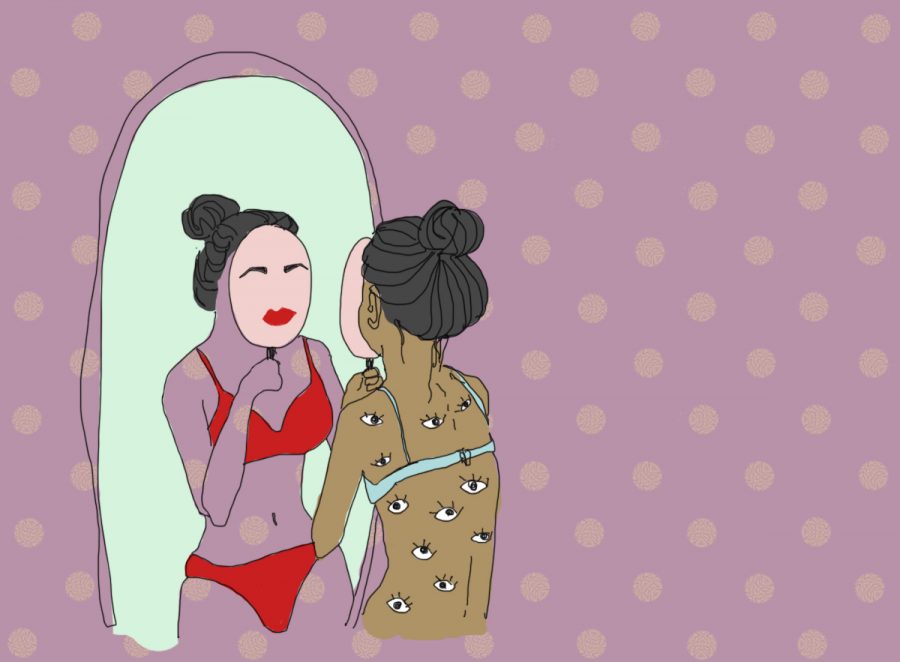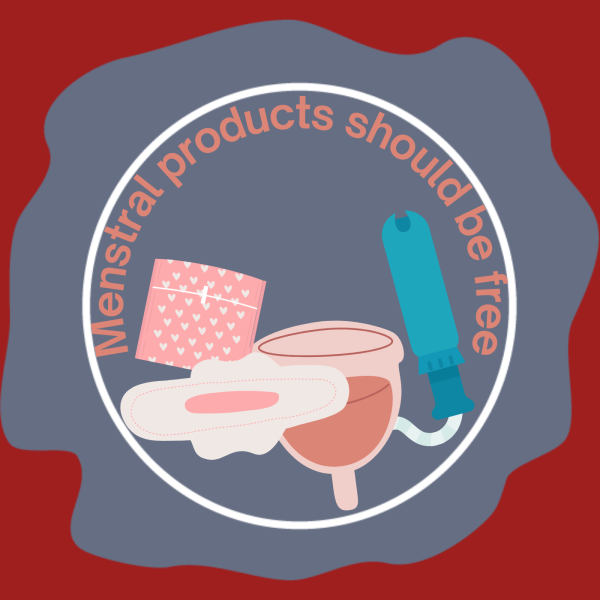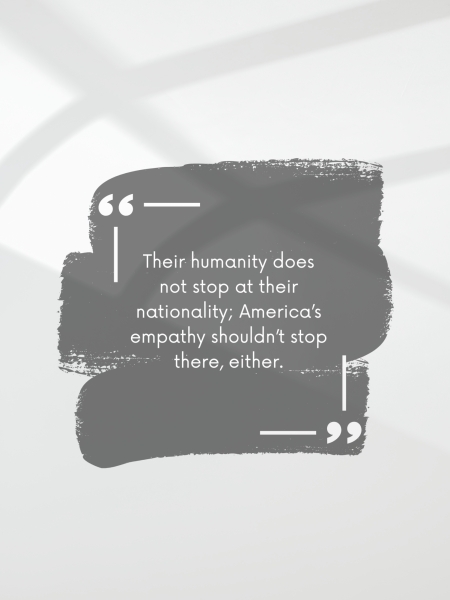Male Gaze proves harmful to women
Sky Russell illustrates the feeling of being watched from the inside out and the distortion with which women see themselves. Image courtesy of thecrimson.com.
“For a while now, I’ve been covering up my body to hide its shape. It has been a long time since I was an adolescent, but the gaze that has followed me everywhere since then has also somewhat become my own. Red looked too striking against my skin, low hanging jeans hugged my curves a bit too much, and figure-fitting tops were out of the question.” said Shreya Bothra of livewire.com.
This feeling of shame and repression women feel from simply having a body is far too common. The fear of being dehumanized and assaulted by straight men causes many women to rethink wardrobe choices. What started as seemingly good-natured movie shots have contributed to the cycles of objectification and self-resentment women tackle daily.
The “male gaze” is a term coined in 1975 by film critic Laura Mulvey. We’ve all seen this at play before. For example, a slo-mo shot of a woman walking in a bikini (extra points if her hair is dry while her body isn’t.) Or when the camera focuses on the female character’s body rather than her face. Or any movie with Megan Fox. The male gaze, according to Mulvey, provides a name to the cinematic way men hypersexualize women for their viewing pleasure.
The male gaze isn’t always used through a woman’s appearance but also through her purpose and how she’s treated. A notable movie many grew up watching, Aladdin, shows Princess Jasmine being handled like a precious item to be locked away by her Sultan father. The villain, Jafar, sees her as a valuable commodity to be taken for increased power. And even the love interest/hero, Aladdin, acts like Jasmine is a prize to be won.
This message may seem harmless, “it’s just a kids movie! Calm down.” The comments are loud and clear, and it’s well known that, yes, children are not watching this movie and thinking, “Wow, this piece of animated cinema objectifies women and portrays them as passive vessels in the fate of their future, while men have agency and use women as objects to further their own personal narratives!” This is common knowledge. But what kind of message, no matter how subliminal, is that?
“What counts is what the heroine provokes, or rather what she represents. She is the one, or rather the love or fear she inspires in the hero, or else the concern he feels for her, who makes him act the way he does. In herself, the woman has not the slightest importance,” said the late Oscar “Budd” Boetticher, a director of classic western films in the 1950s.
Media affects real life in many areas, and its repercussions are widespread. Many women have experienced unwanted stares or comments when they’re in public. In a study done by npr.org in 2018, 81% of US women surveyed said they had experienced sexual harassment. One out of six US women has been a victim of complete or attempted rape, according to rainn.org. The male gaze is used in film because many men believe that womens’ bodies are meant for “one-way surveillance” and their enjoyment, no matter the toll on women.
The male gaze further harms women when it inevitably becomes internalized. As Margaret Atwood put it, “You are a woman with a man inside watching a woman.” It’s feeling the need to perform for a non-existent male audience. Women are constantly readjusting posture, sucking in stomachs, and readjusting clothing without the intent to present for men but unconsciously doing it. Those familiar with the twilight saga may relate it to Edward Cullen watching over Bella Swan as she sleeps.
When asked what the internalized male gaze is, Reddit user Ellamills1 said, “I have such a problem with this. 24/7, I’m constantly behaving like someone’s watching, and I’m terrified to be caught in an ‘ugly’ way. Like even taking a shower or peeing, I’m trying to be all elegant and ladylike like I’m being watched from above. I can’t stop, and it’s got to the point that in my head, I subconsciously convinced myself I actually was being watched over by something… it’s so dumb, but I literally can’t stop, and I always feel like something is over me, and I never feel alone.”
The male gaze is incredibly harmful in the film industry and affects reality. It’s psychologically damaging to women, so much so that many constantly examine themselves from a third-person perspective. The male gaze takes an extreme toll on women’s self-esteem and furthers the social imbalance between males and females. More awareness needs to be brought towards the damaging effects of the male gaze and how filmmakers utilize it to demean women further.






